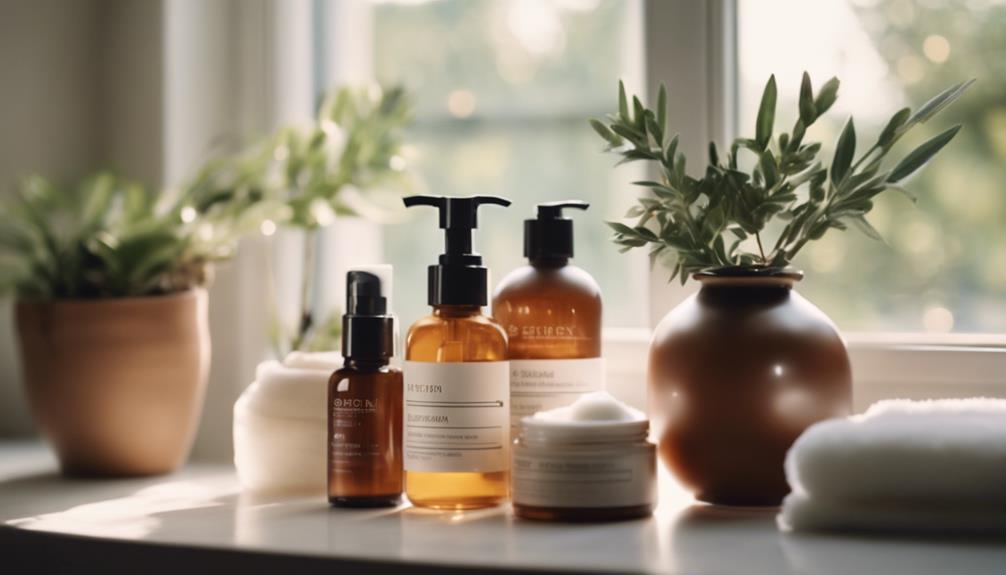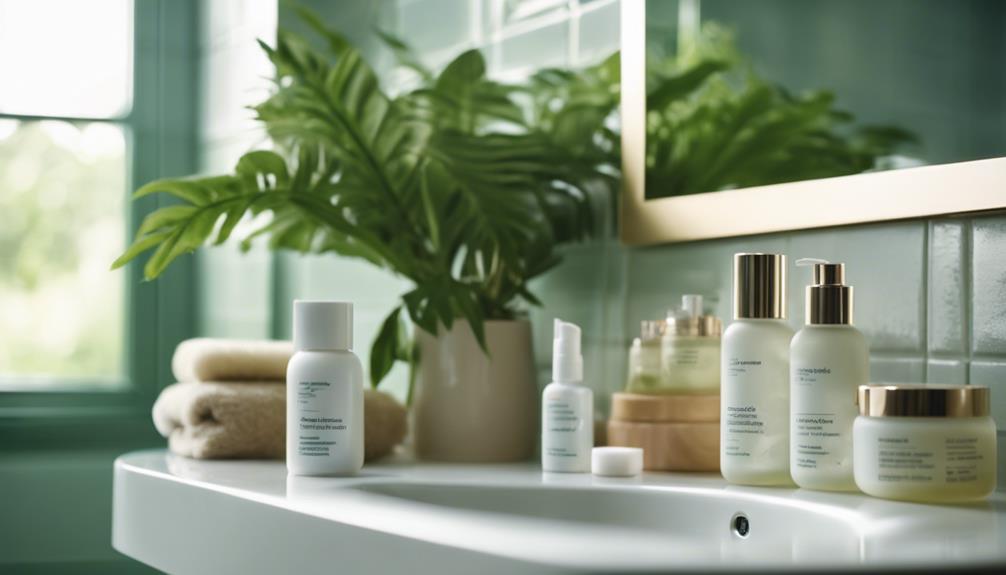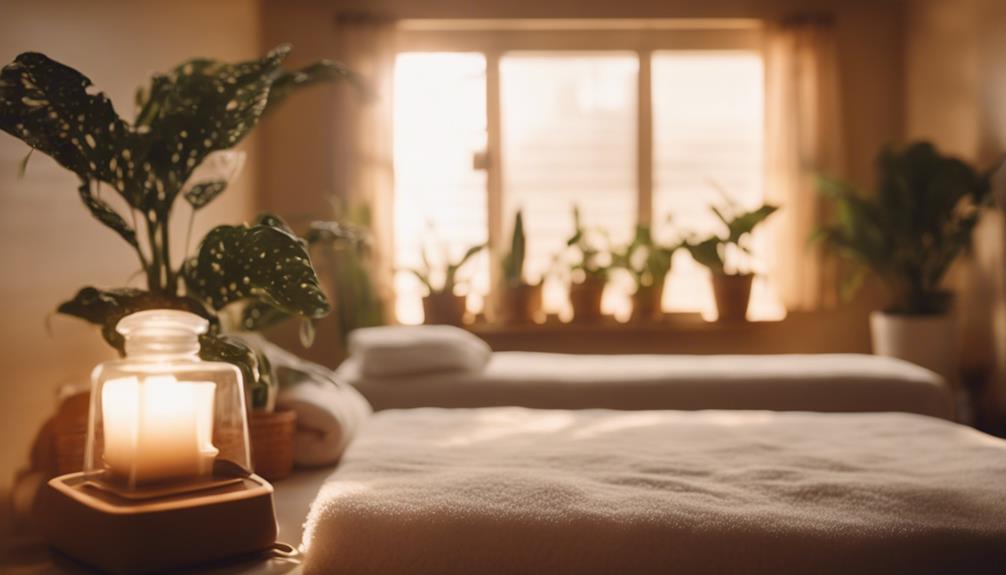For healthy skin, it is important to establish a skincare regimen that includes cleansing, toning, moisturizing, and applying sunscreen. Cleanse your face twice daily to get rid of dirt and impurities, followed by using a toner to maintain your skin’s pH balance. Moisturizing is crucial for keeping your skin hydrated, and be sure to use a broad-spectrum sunscreen with SPF 30 or higher to shield against UV damage. Choose products that cater to your specific skin type, whether it’s oily, dry, or sensitive. Consistency is key for seeing long-lasting results. If you are interested in refining your routine and learning more tips, there is plenty more to discover ahead!
Key Takeaways
- Cleanse your face twice daily using lukewarm water to remove impurities and prevent breakouts.
- Use a toner to balance your skin's pH and enhance hydration for better product absorption.
- Apply a moisturizer suited for your skin type to lock in hydration and protect against environmental stressors.
- Always use broad-spectrum sunscreen with SPF 30+ daily, regardless of the season, to protect your skin from UV damage.
Essential Skin Care Steps
Establishing a proper skincare routine involves three essential steps: cleansing, toning, and moisturizing, which you should practice twice daily for the best results.
First, start with cleansing. This step removes dirt, oil, and impurities from your skin, preventing clogged pores and breakouts. Choose a gentle cleanser suited for your skin type—opt for a gel cleanser if you have oily skin or a cream cleanser if your skin is dry.
Next, incorporate toning into your routine. Toning helps balance your skin's pH and provides hydration, making it easier for subsequent products to absorb effectively. Look for toners with hydrating ingredients to enhance your skin's moisture levels.
Finally, don't skip moisturizing. This step is vital for all skin types as it locks in hydration and maintains your skin's barrier function. Ingredients like hyaluronic acid and ceramides work wonders in keeping your skin hydrated.
If you're heading outdoors, always apply sunscreen as part of your morning routine. A broad-spectrum SPF 30 or higher protects against UV damage, ensuring your skin stays healthy and radiant.
Consistently following these steps will set the foundation for glowing skin.
Importance of Consistency
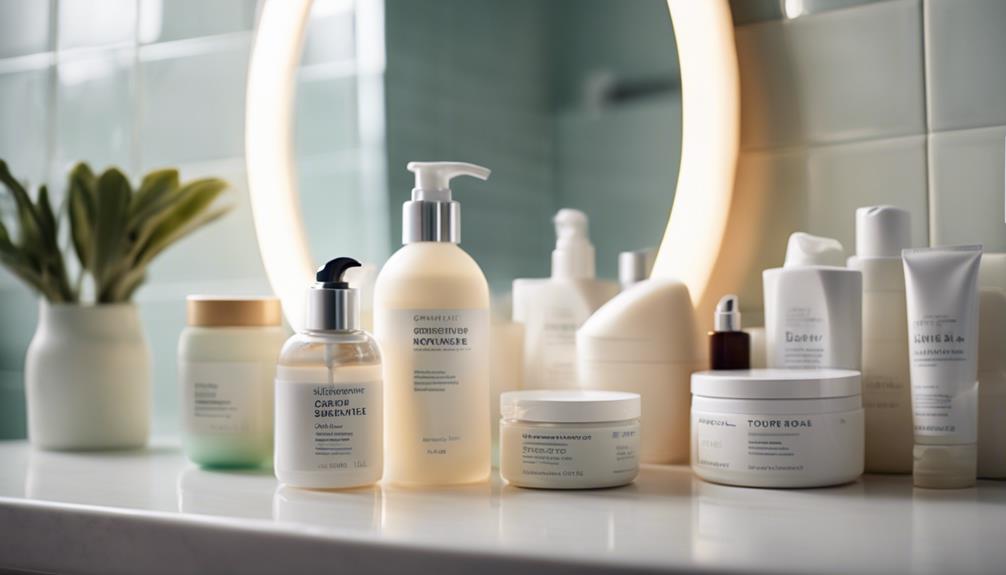
When you stick to a daily skincare routine, you set yourself up for long-term benefits that transform your skin.
Consistency not only enhances the effectiveness of your products but also allows you to monitor changes in your skin condition.
Daily Routine Adherence
Consistency in your daily skincare routine is essential for achieving and maintaining healthy skin, as it helps prevent issues like dryness and acne. When you regularly use the right skin care products, your skin gets the moisture and hydration it needs to thrive. This adherence to your skin-care routine allows your skin to better adapt to external factors, like pollution and climate changes, which can otherwise lead to irritation or breakouts.
By sticking to your routine, you enhance the effectiveness of your products. After at least six weeks of consistent use, you're likely to notice improvements in skin texture and clarity. This means that your skin will be more resilient and less reactive to environmental stressors.
Incorporating skin protection into your daily regimen is vital, as it shields your skin from harmful UV rays and other damaging elements. Establishing this routine not only fulfills your skin needs but also reinforces healthy habits that contribute to long-term skin health.
Long-Term Benefits
Sticking to your skincare routine can pay off considerably, leading to healthier and more radiant skin over time. When you consistently apply moisturizing products, you'll notice a significant boost in your skin's hydration levels, which helps reduce the appearance of fine lines and dryness.
Regular use of targeted treatments like retinoids and serums also plays an essential role in promoting collagen production and cell turnover, giving you a more youthful look as the weeks pass.
Incorporating regular exfoliation into your routine, ideally once or twice a week, prevents clogged pores and dullness, resulting in clearer, brighter skin. Don't overlook the importance of daily application of broad-spectrum sunscreen; it's vital for protecting your skin against sun damage and premature aging.
By committing to these practices consistently, you're laying the groundwork for long-term skin health.
The benefits of a well-maintained skincare routine aren't just immediate; they accumulate over time. So, stick with it, and your skin will thank you with a vibrant, youthful glow for years to come!
Skin Condition Monitoring
Monitoring your skin condition regularly guarantees that you can make timely adjustments to your routine, leading to better overall health and appearance. Consistency is key; it typically takes at least six weeks of regular use to notice significant improvements. By actively monitoring skin conditions, you can identify any changes and adapt your skincare routine accordingly.
Keeping a skincare journal is a great way to track product effectiveness and document any skin changes. This practice helps you understand what works best for your unique skin needs. Daily adherence to your regimen—both morning and night—reinforces skin health and resilience, reducing issues like breakouts or dryness.
Don't forget about regular reassessment. As you age or face environmental changes, your skin's needs will evolve. Periodically reviewing your skincare routine guarantees that you're using the right products for your current condition. This proactive approach will help maintain your skin's health and appearance, allowing you to enjoy long-term benefits.
Understanding Skin Types
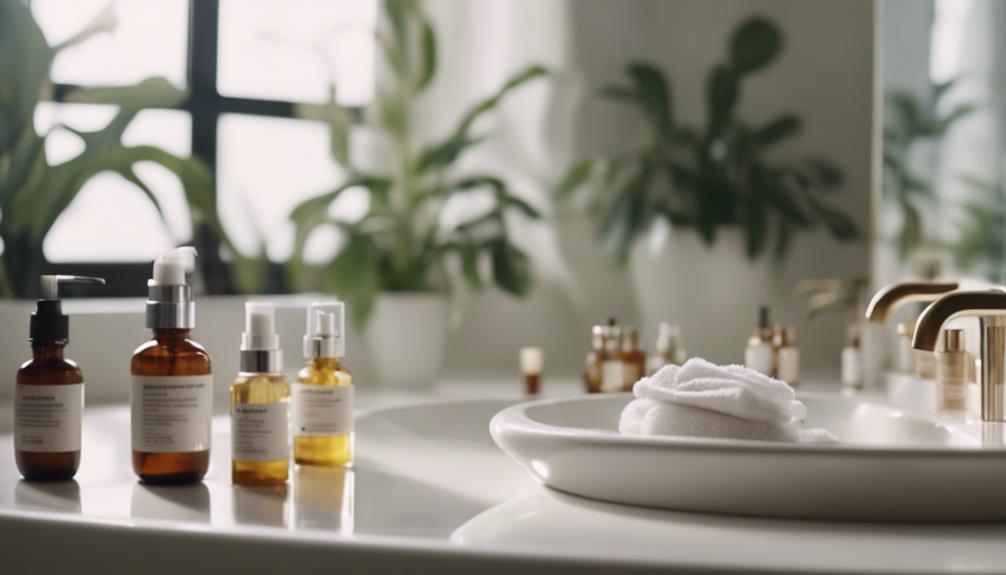
To achieve the best results in your skincare routine, you need to identify your skin type first.
This helps you choose products that suit your specific needs and adjust them with the changing seasons.
Understanding your skin type is the key to effective and personalized skincare.
Identifying Your Skin Type
Identifying your skin type is essential for creating an effective skincare routine that meets your unique needs. There are five main skin types: normal, dry skin, oily skin, combination skin, and sensitive skin. Knowing your skin type helps you choose the right products and treatments.
If your skin feels tight, looks flaky, or has rough patches, you probably have dry skin, which lacks moisture. On the other hand, if your face appears shiny, has enlarged pores, and is prone to breakouts, you likely have oily skin due to excess sebum production. Combination skin displays characteristics of both, often with an oily T-zone and dry cheeks.
Sensitive skin is another category, marked by redness, irritation, and a tendency to react to environmental factors. If you notice these signs, opt for gentle, fragrance-free products to avoid exacerbating the issue.
Understanding your skin type is vital for developing a skincare routine that effectively addresses your specific concerns while maximizing the benefits of the products you use. By recognizing your unique skin type, you set the foundation for healthier, more radiant skin.
Tailoring Products Accordingly
Selecting the right products for your skin type guarantees you effectively address your unique concerns and achieve ideal results. Understanding whether you have oily, dry, combination, sensitive, or normal skin is essential in this process.
For oily skin, lightweight, non-comedogenic moisturizers work best to control excess sebum and prevent clogged pores. If you have dry skin, seek out richer formulations with hydrating active ingredients like ceramides and glycerin.
Combination skin requires a tailored approach, so you might use different products for your oily T-zone and drier areas, ensuring balanced care. For sensitive skin, it's vital to choose gentle, fragrance-free products to minimize irritation. Always perform patch tests with new products to avoid adverse reactions.
If you struggle with acne-prone skin, look for targeted active ingredients such as salicylic acid or benzoyl peroxide. These ingredients help unclog pores and reduce breakouts.
Seasonal Adjustments Needed
Understanding your skin type is key to making seasonal adjustments that keep your skincare routine effective throughout the year. Different skin types have unique hydration needs, and recognizing them helps you address skin concerns as seasons change.
| Skin Type | Seasonal Adjustments | Exfoliation Frequency |
|---|---|---|
| Normal | Maintain hydration; light products in summer | Every 1-2 weeks |
| Dry | Use rich moisturizers in winter; lighter in summer | Every 2-3 weeks |
| Oily | Opt for gel-based products in summer; heavier in winter | Every week |
| Combination | T-zone care in summer; cheeks moisturized in winter | Every 1-2 weeks |
Regardless of your skin type, sun protection is essential year-round. Sensitive skin types may benefit from mineral-based sunscreens, especially in summer to reduce irritation. By adapting your routine to match your skin's seasonal adjustments, you'll maintain peak skin health and address its unique hydration needs and exfoliation frequency, ensuring your skin looks its best all year long.
Tailoring Your Routine
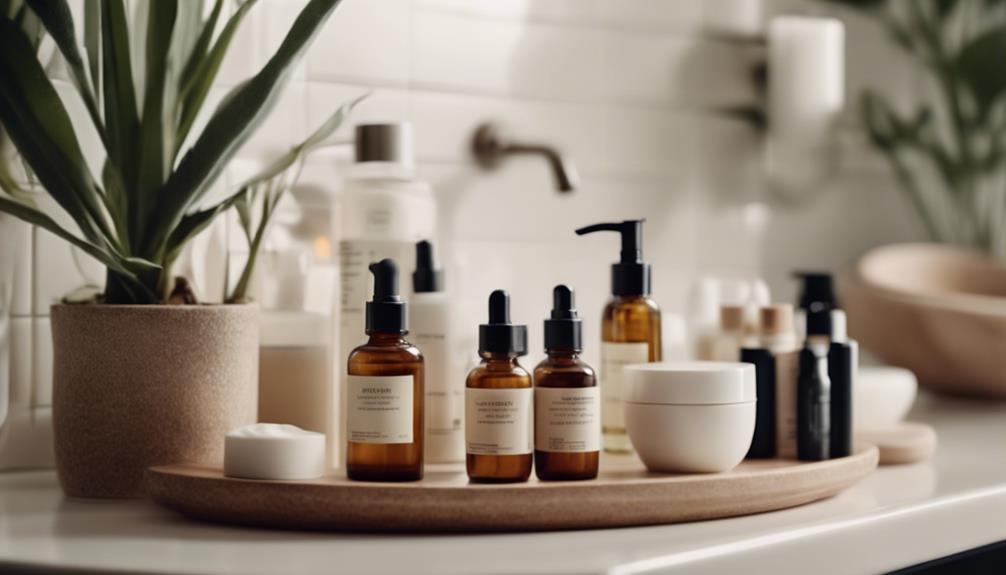
Tailoring your skincare routine starts with recognizing your skin type to choose the right products for your unique needs. Understanding whether your skin is oily, dry, combination, sensitive, or normal helps you select effective skin-care products.
Here are some tips to help you customize your routine:
- Identify your skin type and specific concerns, like acne or skin aging.
- Incorporate key ingredients, such as hyaluronic acid for hydration or salicylic acid for acne.
- Choose a suitable moisturizer that matches your skin's oil production levels.
- Adjust your routine based on seasonal changes to maintain peak hydration.
Effective Cleansing Techniques

Effective cleansing techniques are essential for maintaining healthy skin, as they help remove dirt and impurities while preventing breakouts. To start, cleanse your face twice daily. This routine effectively removes oil, dirt, and impurities, keeping your skin hydrated and preventing clogged pores.
When washing your face, use lukewarm water to rinse, as it opens your pores for a thorough cleanse without stripping natural oils. Apply your cleanser gently in circular motions, paying special attention to areas prone to oil buildup, like your nose, cheeks, and jawline. After massaging, rinse thoroughly to eliminate any residual cleanser, which can cause irritation and dullness.
If you wear makeup, consider double cleansing in the evening. First, use an oil-based cleanser to dissolve makeup effectively. This step guarantees you completely remove makeup while preventing clogged pores. Follow up with a gentle foaming or cream cleanser to purify your skin further and eliminate any remaining impurities.
Key Treatment Ingredients
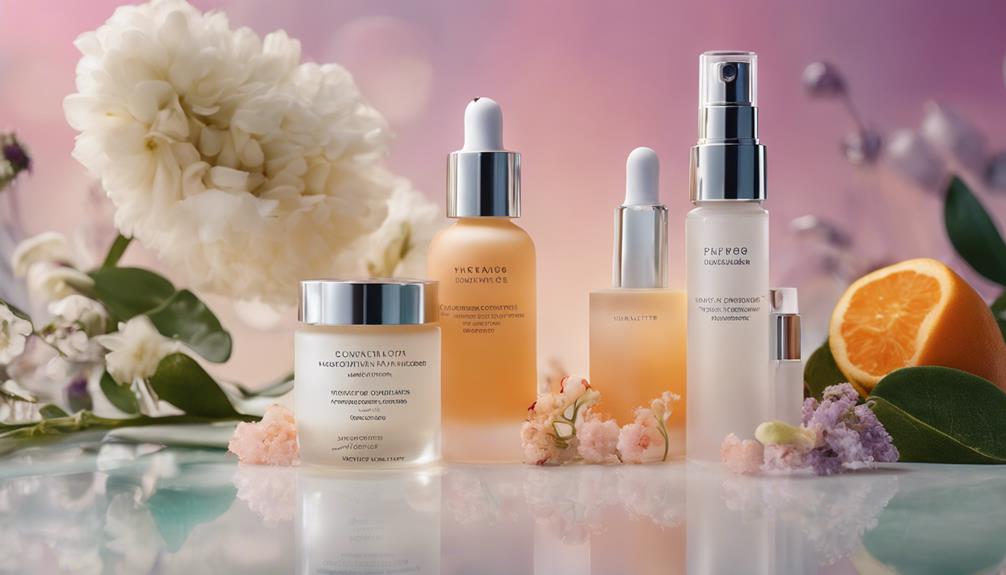
After mastering effective cleansing techniques, it's time to explore key treatment ingredients that can elevate your skincare routine. These ingredients play a vital role in addressing specific skin concerns and enhancing overall skin health.
Here are five essential ingredients to take into account:
- Salicylic Acid: This beta hydroxy acid penetrates pores, dissolving excess oil and dead skin cells to prevent breakouts.
- Hyaluronic Acid: A powerful humectant that retains moisture, keeping your skin hydrated and plump.
- Botanical Peptides: These support collagen production, promoting skin renewal and firmness, ideal for combating signs of aging.
- Natural Retinol Alternatives: Ingredients like bakuchiol offer skin renewal benefits without irritation, making them suitable for sensitive skin types.
Incorporating these key treatment ingredients into your routine can greatly enhance your skin's texture and appearance.
As you choose products, reflect on your skin type and concerns to maximize the benefits and achieve healthy, radiant skin.
Professional Treatments Overview

Professional treatments, like facials, offer targeted solutions that can greatly improve your skin's health and appearance. These treatments provide deep cleansing, exfoliation, and specialized therapies to address various skin concerns, such as acne, hyperpigmentation, and signs of aging.
During an acne facial, for instance, you'll experience extractions, chemical peels, and products containing salicylic acid designed to unclog pores and reduce inflammation.
In addition to these techniques, professional treatments often incorporate targeted masks that enhance hydration, tighten, or soothe irritated skin, maximizing your results.
To get the most out of these services, it's essential to consult with a licensed esthetician. They can assess your skin's unique needs and help you create a personalized skincare regimen that adapts as your skin changes over time.
Addressing Specific Concerns
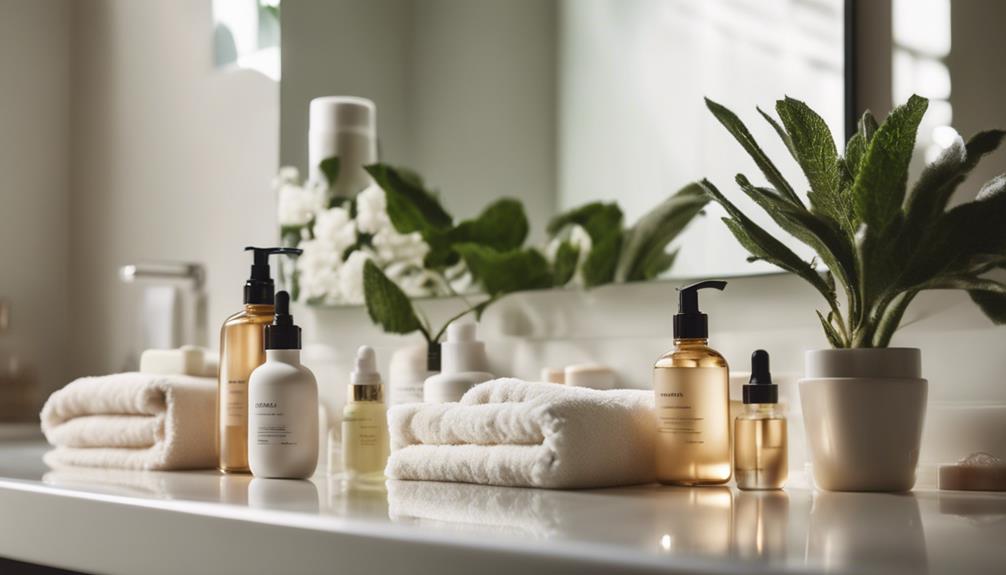
Addressing specific skin concerns requires a tailored approach that targets issues like hyperpigmentation, acne, sensitivity, dehydration, and signs of aging. By choosing the right products, you can effectively tackle these challenges and enhance your skin's overall health. Here are some key strategies:
For dark spots, look for ingredients like stone crop and licorice root to help fade hyperpigmentation.
To combat acne, incorporate salicylic acid or benzoyl peroxide to clear clogged pores and reduce inflammation.
For sensitivity and redness, opt for gentle, fragrance-free products with soothing ingredients like aloe vera.
To guarantee proper hydration, use products containing hyaluronic acid that help retain moisture and improve skin texture.
To address fine lines and signs of aging, consider retinoids or peptides that promote collagen production and enhance skin elasticity.
When you customize your skincare routine to your specific needs, you're more likely to see significant improvements.
Remember that consistency is key, and it might take some time to see the results you desire.
Additional Tips for Success

To achieve the best results from your skincare routine, commit to consistency and incorporate helpful habits that support your skin's health.
Stick to your regimen daily, as it usually takes at least six weeks before you notice improvements in your skin's appearance. Don't forget to include a moisturizer suited to your skin type to maintain hydrated skin.
Regular exfoliation is essential; aim to do it 1-2 times per week to remove dead skin cells and enhance your complexion. Keeping a skincare journal can also be beneficial. It helps you track product effectiveness and recognize any changes, so you can make informed decisions about your routine.
Moreover, never underestimate the importance of sun protection factor (SPF). Incorporate sunscreen with at least SPF 30 into your morning routine to protect against UV damage, which can lead to premature aging and skin cancer.
Finally, stay hydrated by drinking at least eight glasses of water a day. Proper hydration considerably impacts skin health, helping to maintain moisture levels and promote that coveted radiant complexion.
Are the Essential Steps for Healthy Skin Different for Men and Women?
When it comes to maintaining healthy skin, the basic skincare routine for men should not be much different from women’s. Cleansing, exfoliating, moisturizing, and using sunscreen are essential steps for both genders. However, men may benefit from products tailored to their specific skin concerns, such as shaving irritation.
Conclusion
Incorporating these essential steps into your daily routine can transform your skin into a radiant canvas.
Picture yourself waking up to a fresh, glowing complexion, ready to take on the day.
By staying consistent and tailoring your approach to your unique skin type, you're not just caring for your skin; you're nurturing your confidence.
So, embrace these practices and watch as your skin flourishes, revealing the beauty that's been waiting to shine through.
